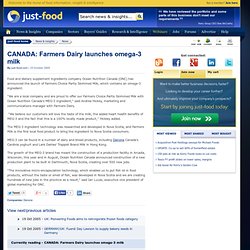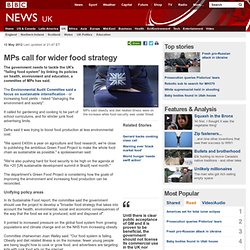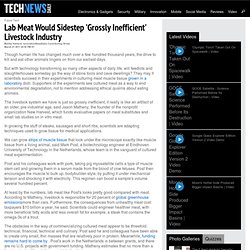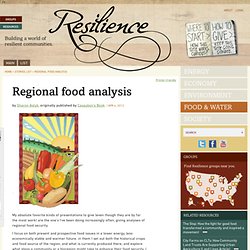

The Consumer Goods Forum. The pillar serves as a “think-tank” for the Forum.

The CGF defines Emerging Trends as those changes gaining a greater long-term prominence, set to continue over the next five to twenty years, and those that concern major issues with a significant impact on, and relevance for, the consumer goods industry. This long-term perspective gives CGF members the chance to respond in good time to these emerging consumer goods trends, shaping the industry for the benefit of consumers. This entails careful consideration of the key social, regulatory and technical factors, in addition to other issues, such as standards and talent development, which are becoming increasingly relevant to the emergence of specific consumer trends within the consumer goods industry. The scope will include primarily global and regional, but also local, trends that affect retailers, manufacturers and their partners along the value chain. Serons-nous tous végétariens en 2050. Si les pays développés connaissent l'urgence à réduire la consommation de viande, peu imaginent adopter dans les prochaines décennies un régime végétarien quasi-généralisé.
C'est pourtant la réalité qui attend la population mondiale d'ici à 2050 afin d'éviter des pénuries alimentaires catastrophiques et des déficits en eau considérables, si l'on en croit une étude du Stockholm International Water Institute, citée par le Guardian. CANADA: Farmers Dairy launches omega-3 milk. By just-food.com | 19 October 2005 Food and dietary supplement ingredients company Ocean Nutrition Canada (ONC) has announced the launch of Farmers Choice Partly Skimmed Milk, which contains an omega-3 ingredient.

"We are a local company and are proud to offer our Farmers Choice Partly Skimmed Milk with Ocean Nutrition Canada's MEG-3 ingredient," said Andrea Hickey, marketing and communications manager with Farmers Dairy. "We believe our customers will love the taste of the milk, the added heart health benefits of MEG-3 and the fact that this is a 100% locally made product," Hickley added. The MEG-3 ingredient technology was researched and developed in Nova Scotia, and Farmers Milk is the first local food product to bring the ingredient to Nova Scotia consumers. Default. Food First/Institute for Food and Development Policy. Home : VPRED.
CODEX ALIMENTARIUS. AgBioWorld - Supporting Biotechnology in Agriculture. Maize Genetics COOP Stock Center's Home Page. The mediterranean diet and food. Mediterranean diet details and mediterranean food exports. College of Agricultural, Consumer and Environmental Sciences at the University of Illinois. SSHA. MPs call for wider food strategy. 12 May 2012Last updated at 21:47 ET MPs said obesity and diet related illness were on the increase while food security was under threat The government needs to tackle the UK's "failing food system" by linking its policies on health, environment and education, a committee of MPs has said.

Lab Meat Would Sidestep ‘Grossly Inefficient’ Livestock Industry. Though human life has changed much over a few hundred thousand years, the drive to kill and eat other animals lingers on from our earliest days.

But with technology transforming so many other aspects of daily life, will feedlots and slaughterhouses someday go the way of stone tools and cave dwellings? They may if scientists succeed in their experiments in culturing meat muscle tissue grown in a laboratory dish. Supporters of the experiments see cultured meat as a way to end environmental degradation, not to mention addressing ethical qualms about eating animals. The livestock system we have is just so grossly inefficient, it really is like an artifact of an older, pre-industrial age, said Jason Matheny, the founder of the nonprofit organization New Harvest, which funds evaluative papers on meat substitutes and small lab studies on in vitro meat. In growing the stuff of steaks, sausages and short ribs, scientists are adapting techniques used to grow tissue for medical applications.
Regional food analysis. My absolute favorite kinds of presentations to give (even though they are by far the most work) are the one's I've been doing increasingly often, giving analyses of regional food security.

I focus on both present and prospective food issues in a lower energy, less economically stable and warmer future. in them I set out both the historical crops and food source of the region, and what is currently produced there, and explore what steps a community or a bioregion might take to enhance their food security. I examine underutilized resources, and what else might be brought into play. I consider how climate change, energy depletion and economic volatility may affect the region. How to design more resilient, food producing systems (without money and fossil fuels) Last week I started to discuss those common cultural barriers and mental blocks that have hindered our progress in preparing for an uncertain future on our small family farm.
We realised these barriers fall into four categories and I started with 'Received Wisdom'. This week I thought I'd try tackling the next two on our list. These two are very much intertwined so I've grouped them together – available money and fossil fuel power Available money Culturally we've been led to believe that lack of sufficient funds hinders progress, but the question to ask is 'progress towards which goal'? We've never been particularly wealthy but it takes surprisingly little money to mess up your thinking.
Little garden shed of consumer horrorsLooking out the window right now I can see a poorly built garden shed with a leaky roof. Basically, having money in our pockets enabled us to out-source the need to use our own brains. Creating compost for free. ATSDR Home.